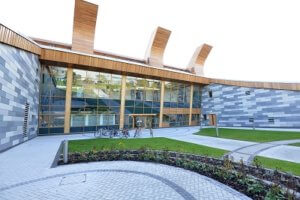 The GlaxoSmithKline Centre for Sustainable Chemistry is the latest landmark development to be undertaken by the University of Nottingham at its Jubilee Campus. Architect, Fairhursts Design Group (FDG) was appointed to design the unique facility and Morgan Sindall was awarded the contract to manage the construction works.
The GlaxoSmithKline Centre for Sustainable Chemistry is the latest landmark development to be undertaken by the University of Nottingham at its Jubilee Campus. Architect, Fairhursts Design Group (FDG) was appointed to design the unique facility and Morgan Sindall was awarded the contract to manage the construction works.
Sustainability was of huge importance to the design and therefore FDG was very particular about the materials specified. The architect was familiar with UK based paving and walling manufacturer, Tobermore, from previous projects and the company’s Eco Fusion and Eco Pedesta offered the perfect solution in both eco credentials and aesthetics.
The 4.500 sq. m. GlaxoSmithKline Centre was developed to house a state-of-the-art new carbon neutral laboratory which is the first of its kind in the UK. The building was part-funded by GlaxoSmithKline and is unique not only in its design but also in its focus on world-leading research that aims for the highest green standards to minimise environmental impact and ensure that new chemistry developed is energy efficient and sustainable.
The focus on sustainability is reflected in the building itself, which incorporates the latest technologies, including solar power and sustainable biomass, to allow it to be carbon-neutral over its lifetime. The excess energy created by the building provides enough carbon credits over 25 years to replace the carbon used in the projects construction.
The choice of materials for the external works was no less important as the University was keen to incorporate a hard landscaping method that reflected their focus on green building. FDG reviewed the Eco Paving products available at Tobermore and Eco Fusion and Eco Pedesta met the design requirements perfectly.
Tobermore’s Eco products achieve their ‘eco’ status from the large percentage of recycled content they are comprised of. This involves waste concrete material, which usually comes from damaged concrete product units that will go unused, undergoing a crushing process. As the waste material is crushed, it is condensed into recycled concrete aggregate (RCA) as a partial replacement for primary aggregates. Following the removal of contaminants via a screening process whereby the recycled concrete aggregate is graded based on the size and quality of the aggregates; the aggregates that pass are used to form products.
Tobermore’s Eco Paving consists of no less than 64% of recycled content and the manufacturers Eco Walling consists of no less than 61% recycled content, thereby achieving a significantly reduced carbon footprint. The beauty of the Tobermore Eco Paving and Walling range is that the products guarantee an equal performance level and all the aesthetic detail and beauty of each non-eco product equivalent.
Like all Tobermore products, the company’s Eco Paving and Walling products are produced via a variety of green manufacturing methods on site at Tobermore’s 50 acre production facility; this includes rainwater harvesting that allows products to be created with recycled water, and the installation of solar panels on the factory roof and a 250KW wind turbine on site have permitted products to be produced with renewable electrical energy.
The GlaxoSmithKline Centre for Sustainable Chemistry has already earned much acclaim as it scooped the award for Best Education Building (Universities and Colleges) at the 2016 Education Estates Awards Dinner and was crowned the overall winner of the East Midlands Forum for the Built Environment Awards 2016.

